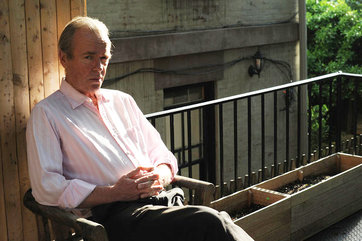Amis, Martin. Lionel Asbo: State of England, Alfred A. Knopf, New York, 2012 (255pp.$29.95)
Critical abuse and his own mercurial temperament have made Martin Amis the permanent bad boy of English letters, even though he is 62 years old and lives mostly in America. Amis (whose father authored the classic “Lucky Jim”) is sometimes his own worst enemy, especially when his archly superior literary powers result in nothing save stylistic pyrotechnics, as in the asinine novels “Yellow Dog” and “Night Train”.
But a surprising number of his novels are genuine classics fictions like “Money”, “London Fields” and “The Information”. A few works of nonfiction such as “Visiting Mrs. Nabokov”, also deserve high praise. His latest novel, “Lionel Asbo”, while not a classic, is certainly a masterpiece of social satire and cultural observation. “Asbo is a book unlikely to inspire praise from multiculturalists, people of high—minded feeling for the downtrodden masses, or the politically correct. But it is dead-on—the reader sweats with the dread of soccer hooliganism, pit-bull fighting, lowbrow yellow journalism, and pornography. It is the same dread of knowing that “Who Let the Dogs In?” is now considered music.
Theplot centers on Lionel Asbo—ASBO for Anti-Social Behavior Order (one of Tony Blair’s Crime and Disorder laws)—a bolt-upright thug whose single-dimension personality partakes of various avatars, from EM (Extortion with Menaces) to GBH (Grievous Bodily Harm) and on to DVD pornography. But his primary metaphysic is spiritual menace brought on by bonding to his family and rivals in a glaring hierarchy of threat, a character who produces as much psychic trauma in the reader as Dickens’ Bill Sykes
Lionel’s family of anti-Cleavers consists of John ,Paul, George, Ringo andStuart (all with different fathers), along with sister, Cilla, and the counter-hero, young Des, Lionel’s nephew, whose real misfortune it is to have a real intelligence. This clan lives in Diston (read Dystopia), which Amis describes as: “In Diston—in Diston, everything hated everything else, and everything else, in return hated everything back. Everything soft hated everything hard, and vice versa, cold fought heat, heat fought cold, everything honked and yelled and swore at everything, and all was weightless, and all hated weight.”
Early on, young Des is introduced to sex by none other than his grandmother (Lionel’s mom), Grace, who began having children at 12. Every page of “Lionel Asbo” throbs under the fevered possibility that Lionel might discover this transgression and reap some horrific revenge on his nephew. One third of the way through the book, Lionel, just released from a short prison stint, hits the Lotto for the staggering amount of $200M. In the tabloids, he becomes the Lotto Lout, and lives a life of dissipation and celebrity, egged on by tag-along paparazzi and super models, one of which manages to market a line of lingerie and underwear called “Self-Esteem” with Lionel’s money.
Certain English critics lambaste Amis for mocking the langue of the lower classes. But Amis captures this lingo perfectly, and uses it to great effect—the word “Hypothesis” becomes, for example, “hypoffesis”. In fact, one of the great joys of reading this noel is its “ear” for speech, and its leering, but not condescending fidelity to language in the face of so much pressure to be politically correct. In the end, “Lionel Asbo” concerns the fate of Des, a mixed-race youth who aspires to a better life. When he meets Dawn (another counter-weight, this time to Grace), he wants to start a family. Des wants an education. He wants to write real journalism. He wants an equal partnership with a woman. He would even like to see a tree or blade of grass on occasion.
We know where the Lionels of the world will end and where they belong. The insistent question is whether there’s room for people like Des. Amis has written a fine, caustic, funny, angry and outrageous book, a book that manages to contain his own wriggling electric ego, and halter it in service to something higher.


